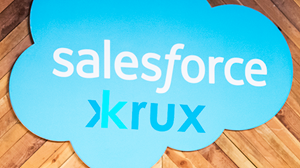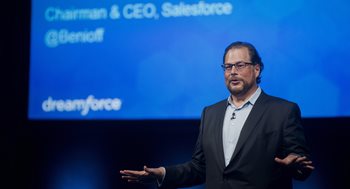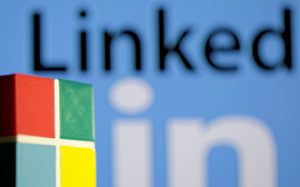Salesforce News Roundup, Including the Twitter Bid
Last month, after Salesforce announced its Q3 guidance, CMS-Connected escalated this rhetorical question: Is Salesforce Done Shopping after Disappointing Q3 Guidance? Apparently, not even close!
 Acquisitions have always been one of Salesforce’s key growth strategies, and Salesforce CEO Marc Benioff, once again, went shopping. The CRM software giant snapped up data management platform Krux in an effort to enable its customers to process more data in their CRM systems. The acquisition's price tag is $700 million including both stock and cash which brings Salesforce’s acquisitions in the last year to nearly $5 billion, unless Salesforce materializes Benioff’s plan to make a bid for Twitter. Before taking a closer look from three different angles at the potential Twitter buyout, I would like to shed some light on why Salesforce acquired Krux.
Acquisitions have always been one of Salesforce’s key growth strategies, and Salesforce CEO Marc Benioff, once again, went shopping. The CRM software giant snapped up data management platform Krux in an effort to enable its customers to process more data in their CRM systems. The acquisition's price tag is $700 million including both stock and cash which brings Salesforce’s acquisitions in the last year to nearly $5 billion, unless Salesforce materializes Benioff’s plan to make a bid for Twitter. Before taking a closer look from three different angles at the potential Twitter buyout, I would like to shed some light on why Salesforce acquired Krux.
Krux will enable Salesforce customers to do advanced segmentation and audience management from within the Salesforce Marketing Cloud (SMC), a platform that also includes marketing automation (acquired via ExactTarget in 2013), social campaign management (Buddy Media in 2012) and social listening (Radian6 in 2011) capabilities.
The acquisition makes total sense as the SMC platform has until now utilized partner integrations to meet its customer's need for data management platform capabilities. In this regard, in 2015, Salesforce entered into a partnership with five data partners of which Krux was one. However, this solution was not effectively working for the customers as the absorbed data from those partners could not fully support all complex instances for marketer data management.
Aside from the partner integration issue, another reason why Salesforce had an acute need for DMP capability was the majority of CRM data stored by Salesforce had been activated on its competitors’ DMPs such as Oracle and Adobe. Especially, Oracle has been strongly focusing on acquiring data platform providers as the company bought four companies, BlueKai, Datalogix, Crosswise, and AddThis, in less than two years.
On a side note, Krux has a significant strength in paid media buying by adding support for header bidding. In fact, according to the company, a group of DSPs and 28 marketer buyers are using the offering to acquire media from the approximately 32 publishers that carry Krux's header-bidding tags. Businesses already using Krux to track their customers include media companies BBC, HBO, NBCUniversal and DailyMotion; publishers The Guardian and Financial Times, and food and drink companies ABInBev, Mondelez International, Kelloggs, and Keurig.
Gartner Research VP Martin Kihn noted, "Recently Salesforce has seemed to be less interested in ad tech and seemed to be doubling down on the CRM side of the business with campaign management, email campaigns and highly targeted advertising mostly through Facebook Custom Audiences. That was fine, but they are missing out on the entire ad tech universe," Kihn said. "Krux gives them entrée into the whole non-Facebook side of advertising."
This acquisition also plays into the bigger intelligence piece that the company has been trying to build by way of its new Einstein machine learning platform. On that note, Krux CEO and Co-founder Tom Chavez wrote on the company blog that the acquisition will allow joint customers of Salesforce and Krux to feed "billions of new signals" to Salesforce Einstein, a suite of AI-based tools for building predictive models.
It’s important to note that Krux also works with other vendors including Oracle, Google's DoubleClick, Criteo and a host of other advertising networks. According to Chavez, it won't be cutting those ties following the acquisition. "Openness remains a guiding principal," he said. "We expect to continue supporting our thriving partner ecosystem and integrating with a wide variety of platforms."
Although the acquisition makes great sense, there are chances the technology itself can become obsolete as Google recently unveiled a new way to track ads that is not based on cookies, which are the basis of a lot of the DMP tracking. Instead, it is based on “log-in” data because it is considered more complete, and commensurate with companies like Facebook have also developed. If Salesforce had ended up buying Twitter, it may have had its own social log-in play, though. (We'll come there in a moment.)
Quip Integration
Salesforce is so often in the news with its acquisitions, but it doesn’t mean that the company is wasting any time putting these new technologies to use in an effort to blow the competitors’ technologies completely out of the water. Therefore, at its annual Dreamforce conference in San Francisco, which included everything from a rapper to the 25 Buddhist monks leading "on-demand meditation" at two mindfulness zones, Salesforce announced that the company will enable its users to use newly released Single Sign-On (SSO) to access Quip, which is a productivity application that Salesforce acquired in August for about $600 million, with their Salesforce username and password. The users will also be able to place data and records from its services inside Quip’s spreadsheets and word-processing documents. According to the release, a new Lightning Component for Quip will enable teams of employees to access their Quip Living Documents from the Salesforce platform or extend its capabilities into other apps. Users will also be able to use Salesforce Rich Mentions in Quip documents.
 “It really means that your productivity tool in Quip is really tightly integrated” with Salesforce, Bret Taylor, Quip founder and CEO, said in a briefing. By mid-2017, users will also be able to embed live customer relationship data into their documents and associate their work with a Salesforce record. Bret Taylor explained, his team wants to make Quip work across all Salesforce clouds and transform it into an all-in-one hub for "living documents" that seamlessly merge documents, spreadsheets, task lists and team chat. He also took aim at the rivals and said: “Unlike Microsoft Office or Google Docs, pieces from all four Quip elements (documents, chat, email and spreadsheets) can be combined in the same file.” He believes that a collaborative smorgasbord of ideas and teamwork that serves as the hub for all of a team’s work is the endgame.
“It really means that your productivity tool in Quip is really tightly integrated” with Salesforce, Bret Taylor, Quip founder and CEO, said in a briefing. By mid-2017, users will also be able to embed live customer relationship data into their documents and associate their work with a Salesforce record. Bret Taylor explained, his team wants to make Quip work across all Salesforce clouds and transform it into an all-in-one hub for "living documents" that seamlessly merge documents, spreadsheets, task lists and team chat. He also took aim at the rivals and said: “Unlike Microsoft Office or Google Docs, pieces from all four Quip elements (documents, chat, email and spreadsheets) can be combined in the same file.” He believes that a collaborative smorgasbord of ideas and teamwork that serves as the hub for all of a team’s work is the endgame.
To me, the differentiators of Quip from Google Docs are the dedicated desktop files, meaning that you don't have to work only in a browser and the design of the documents highlights collaboration, with real-time chat, emoticons, and iMessage style conversations. I think the best outcome of the integration is to minimize emails and mess of instant messaging conversations along with other notifications.
Apparently, I’m not the only one who likes the platform as Pinterest President Tim Kendall explained how Pinterest teams have adopted the Quip platform on the stage of the Yerba Buena Center for the Arts: “If we create a form in which multiple departments can collaborate or interweave their work then we can create something better. The whole is greater than the sum of the parts,” he said. “Quip is perfect for that.”
The challenge for Quip, though, is convincing people to switch from their longtime solutions such as Microsoft or Google.
The Twitter Controversy
You must have heard by now that Salesforce founder and CEO Marc Benioff has been eager to make a bid for Twitter but he was forced by the company’s skeptical investors to defend his apparent interest in buying the microblogging platform. Moreover, some investors have even pushed Salesforce stock down about 5 percent since news broke that the company was considering bidding for Twitter.
The primary reason from the investors’ perspective was that any deal would very likely be Salesforce’s largest, with Twitter valued at about $14 billion. Salesforce, which is unprofitable, has a market capitalization of about $48 billion, although the price of Twitter may become more flexible as Apple, Google, and Disney have stopped pursuing the social media company. But again, the main question on the investors’ mind was “how much value is Benioff willing to give up for Twitter?” Another concern was the company’s expansion plan as Salesforce has agreed to only nine M&A deals so far this year, according to FactSet. However, the company ended up doing 10 so far (Krux, HeyWire, Gravitytank, BeyondCore, Quip, Coolan, Demandware, Implisit, MetaMind and Prediction IO).
The investors were not the only skeptical party for this buyout. There are some analysts strongly recommending the company not purchase Twitter. These comments didn’t soothe investor anxiety but shares of Salesforce tumbled 8% as Mizuho analysts warned that an acquisition of Twitter could destroy up to 25% of Salesforce’s value. To be more exact, if Salesforce were to buy Twitter, Mizuho analysts said they believe the acquisition would wipe out $12 billion to $17 billion of Salesforce’s combined value with Twitter, or 20% to 25% of the company. They also pointed out that the company would have to increase cash compensation to make up for high levels of stock-option expense used by Twitter, and would not derive short-term value from the acquisition: “We did not assume any revenue or cost synergies in our calculation as they are completely different businesses and chances are that Salesforce.com might have to invest in it to drive growth.”
Another interesting comment came from Joel Fishbein, Managing Director at BTIG, a financial services firm: “This would be a disaster. Benioff is a visionary, but this could blow up. Engineers could leave Salesforce, and it would send the stock down 30 or 40 percent.”
 For many, the two companies could not be more different. Simply because Twitter is where individuals share their thoughts in 140-character messages while Salesforce on the other hand, develops online software for salespeople and marketers. However, in Benioff’s eyes, Twitter is not only a powerful customer service tool that airlines, restaurants, banks and many other companies use to field consumer complaints and requests, but also a great platform to understand consumer habits. Therefore, at the St. Regis San Francisco Hotel, Benioff conducted a meeting with Wall Street analysts and investors to ease their concerns about his plan to acquire Twitter.
For many, the two companies could not be more different. Simply because Twitter is where individuals share their thoughts in 140-character messages while Salesforce on the other hand, develops online software for salespeople and marketers. However, in Benioff’s eyes, Twitter is not only a powerful customer service tool that airlines, restaurants, banks and many other companies use to field consumer complaints and requests, but also a great platform to understand consumer habits. Therefore, at the St. Regis San Francisco Hotel, Benioff conducted a meeting with Wall Street analysts and investors to ease their concerns about his plan to acquire Twitter.
Besides that high-stakes meeting, Marc Benioff, who’s himself a power user of Twitter, explained to CNBC why Twitter might be a good fit for his company. He also stressed that he’s buying the micro-blogging site.
“When it comes to Twitter you have to look it like this,” said Benioff on CNBC. “We look at everything, you name it we had a look at it. It’s in our interest to look at everything. We have to go deep on everything. We have to understand what is possible for our shareholders and what isn’t.”
During the panel discussion with General Motors CEO Mary Barra at Dreamforce, the Salesforce CEO was asked how a micro-messaging service - without naming Twitter - that isn’t particularly enterprise focused might fit into Salesforce’s enterprise-software business, and he answered: “One of the most exciting things that’s going on right now is that we’re moving into a world where everything is one-on-one and the ability for a company like General Motors to speak directly to that consumer is more important now than ever,” Benioff explained. “The ability to bring that information down – the intelligence of that one-on-one relationship – all the way down to the consumer, with the intelligence built in, that is an incredible opportunity.”
Finally, after all these debates and back-and-forth discussions, Salesforce CEO Marc Benioff gave an interview to the Financial Times and said that the company ruled out the acquisition, sending shares of Twitter's stock to their lowest level since August: “In this case, we’ve walked away. It wasn’t the right fit for us,” Benioff said. If you were looking for an official confirmation, it can’t get more official than that. A Salesforce spokeswoman confirmed that the company wouldn’t make a bid for Twitter. Salesforce shares rose 6.2% following the news, whereas a Twitter spokeswoman declined to comment.
SFDC to Block Microsoft's Acquisition of LinkedIn
Since I’m wrapping up everything Salesforce has recently been up to, this article would be incomplete if I left out the news that Salesforce is urging the European Union to block Microsoft's acquisition of LinkedIn because of concerns over how Microsoft plans to use LinkedIn’s data in its productivity suite.
 Burke Norton, Chief Legal Officer at Salesforce, said: “Owning LinkedIn would give Microsoft an unfair competitive advantage because it could block rivals’ access to the data on its membership.” He said the deal also raises “data privacy issues” that Salesforce believes U.S. and European Union authorities should inspect: “Microsoft’s proposed acquisition of LinkedIn threatens the future of innovation and competition.”
Burke Norton, Chief Legal Officer at Salesforce, said: “Owning LinkedIn would give Microsoft an unfair competitive advantage because it could block rivals’ access to the data on its membership.” He said the deal also raises “data privacy issues” that Salesforce believes U.S. and European Union authorities should inspect: “Microsoft’s proposed acquisition of LinkedIn threatens the future of innovation and competition.”
Microsoft did not stay silent and responded by pointing out that the deal had already passed regulatory muster in some countries, and counter-attacked by saying that it is Salesforce, not Microsoft, that dominates the customer relationship management market in which LinkedIn’s data may help Microsoft compete against Salesforce. “Salesforce may not be aware, but the deal has already been cleared to close in the United States, Canada, and Brazil,” said Brad Smith, Microsoft’s Chief Legal Officer. “We’re committed to continuing to work to bring price competition to a CRM market in which Salesforce is the dominant participant charging customers higher prices today.”
Besides the companies, Michael Carrier, a Professor at Rutgers Law School, who specializes in antitrust issues, also commented on the claim: "Antitrust issues arising from the acquisition of immense data sets have been raised in technology mergers in both the EU and the U.S., but no merger has been derailed on those grounds."
The European Union antitrust watchdog signaled Thursday that big data will continue to play a role in assessing merger deals. In a speech, the EU’s Competition Chief, Margrethe Vestager, said she would “keep a close eye on how companies use that data.” The EU’s review of Microsoft’s purchase of LinkedIn likely will focus on whether the professional network’s data “has a very long durability or might constitute a barrier for others,” Ms. Vestager told Bloomberg after the merger was announced.
On a final note, Salesforce hasn’t filed a formal complaint against Microsoft in connection with its purchase of LinkedIn, yet. However, the company filled out a questionnaire sent by the European Commission, which solicits information from companies potentially affected by mergers and acquisitions as part of its normal preregistration process.

Venus Tamturk
Venus is the Media Reporter for CMS-Connected, with one of her tasks to write thorough articles by creating the most up-to-date and engaging content using B2B digital marketing. She enjoys increasing brand equity and conversion through the strategic use of social media channels and integrated media marketing plans.